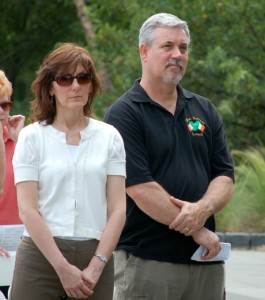If good things truly come in threes, you don’t need to look any further for proof than Temple heart transplant nurse Liz Kerr.
Kerr has always been inspirational—certifiably so when, in 2010, she was selected to be one of the first Inspirational Irish Women. She is also extremely active in the Ladies Ancient Order of Hibernians, co-founder of Brigid McCrory Division 25.
But within the past month or so, Kerr racked up a trio of triumphs:
- She graduated from Arcadia University with a master’s in fine arts in writing.
- A short story she wrote won first prize for fiction in the City Paper’s annual writing contest.
- Franklin’s Paine Skatepark opened on a large, open tract just off the Benjamin Franklin Parkway, culminating many years of work and bringing to fruition the most fervent desire of her son Patrick, who died in a skateboard accident in 2002 at the age of 15.
We met on a sunny Sunday afternoon at the skate park—it seemed fitting—and we found a reasonably shady spot out of the way of the kids on boards and two-wheel scooters hurtling by.
Kerr is particularly proud of her degree. It’s tough to see how she fit it into her already jam-packed life, but she was powerfully motivated.
“It took two years. It was really intense, but in a good way,” she said. All the same, she laughed, “I finally have my life back.”
Kerr chose the Arcadia program because it strongly promoted the idea of submitting your work for publication—which she did, with relish. Last year she was fortunate to be the runner-up in the fiction category of the City Paper’s annual writing contest. But this year, her short story “After the River,” an unvarnished examination of ordinary lives and loss set in Philadelphia, snagged the top prize, earning the following jaw-dropping review from judge Bee Ridgway:
“After the River” is a gorgeously crafted short story. The first sentence shows us that we are in the hands of a master of American style: the image that cuts to the core of the story’s meaning. The larger shapes of the story are woven together perfectly. The personal loss that traps the main characters becomes the loss that defines the city … and that we see mirrored in other cities across the nation. This is a love story to Philadelphia—and also a eulogy. It is, in my opinion, a heartbreaking triumph.
Kerr also recently published a short story for a compilation, Rust Belt Rising Almanac, published by The Head & The Hand Press. The story, “Radium Girls,” is about female factory workers who developed cancer after exposure to radium while painting watch dials early in the 20th century. It seems like a long time, but women factory workers worldwide, she said, are still exposed to risk. “It just makes me sad to think about the girls who were dying then … and they’re dying now.”
Kerr read from the story recently at a release party–something she doesn’t like to do. “I’m a terribly nervous reader,” she said, “but my family was there, so that kept me calm.”
More stories are on the way, she added. As much as she loves writing, how could it be otherwise?
“Nursing is a great career, but my fun thing is to write. I’ve always wanted to write. It’s just so exciting to get published,” she said.
As the conversation continued, Kerr stopped now and again to say hello to some of the kids on skateboards she has come to know, and to chat with suitably impressed first-time visitors. Kerr is proud of many things, but Franklin’s Paine Skatepark would have to be high on the list.
Patrick Kerr was an early advocate for safe places to pursue his sport–places where, as in Love Park, skateboarders wouldn’t be hassled for doing something they loved, probably more than anything in their lives.
Kerr, for her part, never understood the inclination to criminalize the kids. Skateboarding, she said, “kept kids out of trouble. They made friends, they stayed healthy. They were out in Love Park doing something rather innocent, I thought.”
The climate changed, she said, when John Street became mayor. In him, the skateboard community found a receptive audience. And at the same time, members of City Council—notably Jannie Blackwell—took up the cause.
After Patrick’s death, Kerr threw her lot in with other skateboard advocates to bring safe, hassle-free parks to the city and surrounding areas. Franklin’s Paine might be the most ambitious of all the projects, and Kerr expects it to become known nationwide as an outstanding example of how to blend skateboarding into an urban environment.
Of course, it’s impossible to forget the inspiration behind her support for the cause. Patrick is memorialized with a plaque on a wall overlooking the park. But his spirit is there in yet another way. The contractors who were pouring concrete for the job asked the couple if they had anything of Patrick’s to blend into the mix.
They chose a lock of Patrick’s hair, and one of his guitar picks.
“That’s what we did,” she said, clearly moved. “Some people might think that’s a strange gesture, but to us, we wanted him here.”

